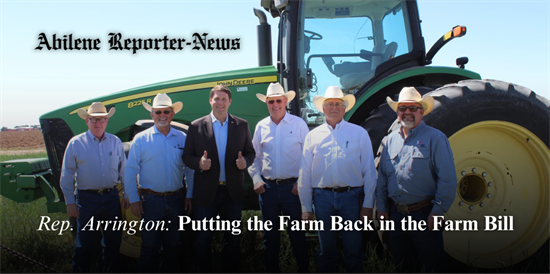In the News
Opinion: Putting the Farm Back in the Farm BillContribution by Jodey Arrington, U.S. representative, Texas 19th Congressional District
Washington,
June 11, 2025
Tags:
Agriculture
It’s time to get serious about fiscal responsibility, improve taxpayer stewardship and put the farm back in the Farm Bill.
Putting the Farm Back in the Farm BillBy Jodey Arrington U.S. representative, Texas 19th Congressional DistrictJune 11, 2025 AS SEEN IN THE ABILENE REPORTER NEWS For the better part of three decades, Congress has consistently relegated the Farm Bill to a “Food Stamp Bill” — rapidly expanding and elevating social welfare while reducing production agriculture programs to merely a footnote. Since 1961, the Supplemental Nutrition Assistance Program has been inextricably tied to the Farm Bill, and, in that time, its funding has eclipsed the risk management resources dedicated to agriculture — now representing approximately 80 percent of all Farm Bill program spending. Yet whenever Republicans have tried to refocus the Farm Bill on U.S. production agriculture and reform SNAP to its original mission of promoting work and self-sufficiency, Democrats have held it up, accusing us of targeting vulnerable populations. The result? SNAP’s work requirements have been routinely waived or watered down over the years, leaving millions of able-bodied adults trapped in a cycle of government dependence and allowing the program to become fraught with waste, fraud and abuse. The numbers speak for themselves. According to data from the U.S. Department of Agriculture, only 16 percent of able-bodied adults without dependents on SNAP comply with the minimum 20 hours per week work requirement. Meanwhile, SNAP error rates — the percentage of funds that are either over-or underpayments — have soared with the national average now exceeding 11 percent and costing the federal government over $10 billion annually. This is unacceptable for taxpayers and unsustainable for the long-term viability of the program itself. In 2001, federal investment in the farm safety net and SNAP were split evenly. Since then, federal spending on food stamps has outpaced the farm safety net by roughly 250 percent. As policymakers have struggled to prioritize American agriculture in the Farm Bill, farmers now struggle to keep pace with massive upticks in input costs, suppressed commodity prices and extreme weather events. During the 118th Congress, Republicans again fought to improve the farm safety net, but Democrats obstructed, resulting in ad hoc disaster payments, which have been unpredictable for farmers and more costly for taxpayers. Recognizing this urgency, House Republicans recently passed the One Big Beautiful Bill Act — the most significant Farm Bill reform in years. This legislation strengthens the agriculture safety net commensurate with the significant increased financial losses for our farmers and ranchers caused by the excessive regulations and unbridled spending of the Biden administration. These reforms will help stabilize the ag economy and bolster rural communities. The bill also makes long overdue investments in the Federal Crop Insurance Program, ensuring producers are better protected from droughts, wildfires, storms and floods. Additionally, by enhancing USDA’s trade promotion programs for the first time since 2006, we are paving the way for American commodities by opening new market opportunities for producers to sell abroad. On the nutrition side, the bill tightens work requirements in SNAP for healthy able-bodied adults, eliminates loopholes that allow states to waive these requirements and holds states accountable for waste, fraud and abuse. Some states improperly spend over one-third of their federal SNAP funding with the worst offender Alaska having an almost 60 percent error rate in SNAP distributions. States will have a cost-share arrangement that is based on their performance in protecting tax dollars. The better they do, the less they pay. This bill will also improve program integrity and its long-term sustainability by ensuring only those lawfully in our country are eligible for SNAP benefits. Allowing ineligible individuals to siphon money from the program is a slap in the face to taxpayers and a disservice to those who depend on it the most. As someone concerned about the deficiencies in both the safety net for farmers as well as for our most vulnerable American citizens, I have long called for Republicans to use budget reconciliation to advance Farm Bill reforms to address both. That’s why we seized this historic opportunity to strengthen our food supply by modernizing farm programs while restoring fiscal accountability and the dignity of work through responsible SNAP incentives. That’s what makes this budget reconciliation bill not only big and beautiful but better and brighter for Rural America. It’s time to get serious about fiscal responsibility, improve taxpayer stewardship and put the farm back in the Farm Bill. U.S. Rep. Jodey Arrington of the 19th Congressional District represents the Abilene area in Congress. The Republican from Lubbock is the chairman of the House Budget Committee. |



